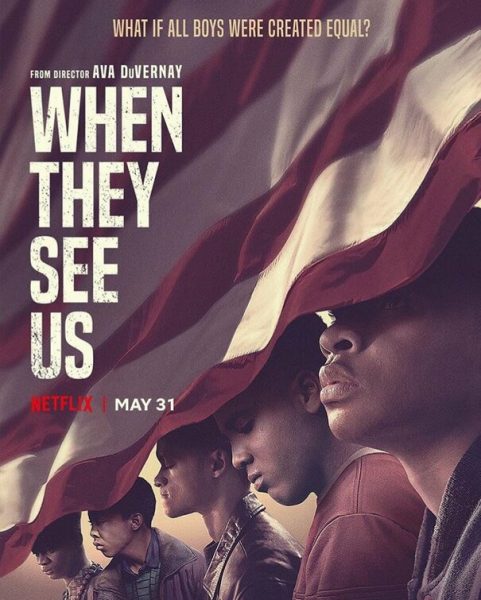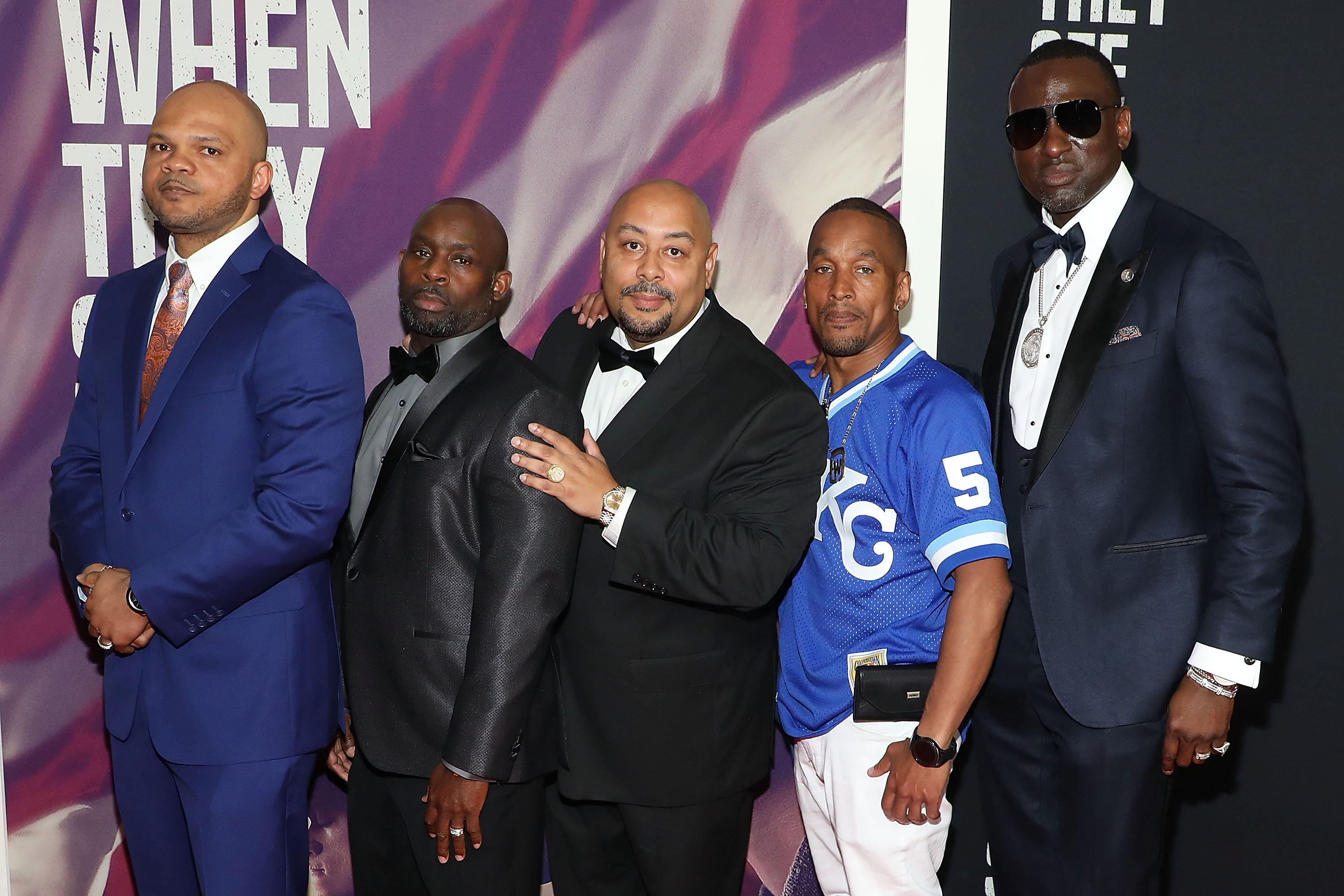Review: When They See Us
 Monday, June 3, 2019 at 1:20PM
Monday, June 3, 2019 at 1:20PM
By Spencer Coile
 Ava DuVernay, notable for her righteous films like Selma and 13, is unafraid of holding a mirror up to a culture that has condemned the subjects of her work. Her Netflix limited series, When They See Us is a piece of television that is rooted in the history and the humanity of its subjects. Following a contentious court battle, five boys (all either Black or Hispanic) were convicted of a crime they did not commit.
Ava DuVernay, notable for her righteous films like Selma and 13, is unafraid of holding a mirror up to a culture that has condemned the subjects of her work. Her Netflix limited series, When They See Us is a piece of television that is rooted in the history and the humanity of its subjects. Following a contentious court battle, five boys (all either Black or Hispanic) were convicted of a crime they did not commit.
Accounts of the Central Park Five have been speculated and picked apart for decades, including necessary think-pieces, documentaries, and protests. After all, they were exonerated of all their crimes in 2002. When They See Us presents the timeline of this case; interrogation to court to their eventual release. These are all facts that a simple Wikipedia search would produce. What makes DuVernay’s work so astonishing, though, is the way she imbues this narrative - one that is deeply embedded in our public consciousness - with traces of anger, and above all else, grace.
When They See Us opens in Harlem on April 19, 1989. “I Got it Made” by Special Ed pulsates as each of the five boys is introduced. Raymond Santana (Marquis Rodriguez), Kevin Richardson (Asante Blackk), Antron McCray (Caleel Harris), Yusef Salaam (Ethan Herisse), and Korey Wise (Jharrel Jerome) have seemingly separate lives from one another. For the most part, they do not know each other, as they come from different socioeconomic backgrounds and from different families. We are given brief snapshots into their lives before they are thrust into a situation they did not knowingly enter. Although all five boys were present in Central Park at the same time, they were not together; nor were they anywhere near Trisha Meili, a jogger who was beaten and raped by an unknown assailant.
Unfortunately, prosecutor Linda Fairstein (Felicity Huffman, in a heinous wig) finds an opportunity to convict all five boys together. There is no evidence that supports her conviction and it is pure happenstance that they were in the park at the time of the crime, yet the police use coercive strategies to force each of the boys to admit wrongdoing. Without sleep, food, or guidance from their parents, they are told that if they cooperate in finding the alleged attacker, they would be let go. Except, they were manipulated by a system designed to protect them. And in a court of law, their taped confessions are damning enough for the jury to consider them guilty.
When They See Us is complex storytelling. Ava DuVernay seems interested in telling her audience precisely “what” happened to these boys, but she transcends the typical biopic narrative structure by focusing more so on the interior of Ray, Kevin, Antron, Yusef, and Korey. We know they were convicted and we know they were subjected to a racist criminal justice system that still commits grave injustices. Amidst the trial, one of the boy’s attorneys, Mickey Joseph (Joshua Jackson) asks for District Attorney Elizabeth Lederer (Vera Farmiga, in an even more heinous wig) to play fair in her case. When he claims this is about justice, Lederer remarks:
It’s no longer about justice, Counselor. It’s about politics. And politics is about survival. And there’s nothing fair about survival.
This chilling sentiment reverberates throughout the remainder of When They See Us. If the first two episodes were about a corrupt political system, its final two are about the boys’ survival. Episode three follows Ray, Kevin, Antron, and Yusef as they are initially convicted and communicating with their families, but then switches to their release years later. Their stories are told separately, but their struggles intersect: finding work, balancing relationships, having to identify as sex offenders.
It hurts to watch their assimilation into a society that has seemingly left them behind. This is due, in large part, to the fact that DuVernay does not offer any time cards to let us know how long they were in prison or when they were released. Unless we knew otherwise, we have no idea how much time has passed or even what year it is. The only visual cue is that each boy is now played by a grown adult. This visual trick packs a wallop -- because each grown man looks starkly different from their adolescent counterparts. Any hint of youthfulness is gone. What remains is world-weariness and defeat.
As each man returns back into the “real world,” they wonder: whatever happened to Korey? His story is not present until episode four. Life in prison is not a prevalent motif for the other men in When They See Us. Instead, DuVernay saves this for Korey; the only member of the Central Park Five who refused to admit guilt for the crime all those years ago. Largely, his time in prison is spent in solitary confinement - a request that Korey makes himself. In a tiny holding cell, he forces himself to reflect on what happened April 19, 1989. He relives that night over and over again, wondering what his life would have been like if he hadn’t gone to the park. Here, DuVernay takes the bleak realism she employs for most of the series and brings an almost heartbreaking whimsy. What could have been for these men? How different would their lives be? But does wondering this even really matter?
When They See Us confronts these brutal realities head-on. Because that is what this series is. It is righteous and angry television. Watching it, I felt sick to my stomach. Anticipating the injustice made my blood boil. But DuVernay, skilled as she is, shades in these moments with traces of grace and warmth. The support each boy receives from their family is enough to make you want to weep from the sheer goodness they exude. They provide great comfort and unconditional love in a time when they need it most. As one family member says:
You know what ain’t changed. You.
 Kevin Richardson, Anton McCray, Raymond Santana, Korey Wise, Yusef Salaam
Kevin Richardson, Anton McCray, Raymond Santana, Korey Wise, Yusef Salaam
The truth is obscured and justice is served too late. Yet these five men handle it with humanity. The series ends, as it should, with a close-up shot for each of the five men in real life and we are told where they are now. It is a technique we’ve seen used for so many biopics. Only, with an auteur like DuVernay, it is somehow more unique. The camera will either slowly pan up or down to their face and they will then make direct eye contact with the camera. Some of them stone-face. Others smile slightly. Regardless, it is a confrontation. It is a reminder of the years these men lost and of a system that cast them aside. But it is also an urgent plea: do better. We must do better.



Reader Comments (6)
Lovely writeup, Spencer. I know I should see this, I know everyone should, but I'm not sure I'm up to it - even if it's not all unmitigated pain, it's still too much. I do hope it gets seen widely, and not just by those who already know (or think they know) the story.
This was a brilliant piece of storytelling. The first 2 episodes left me breathless. It is a story that ALL should see.
PS I love the way she inserts Trump into the picture.
I watched it one day at a time because I knew how heavy it would be to stomach it.
I'm still fresh off ep. 4 but i think it's Ava's crowing achievement in her filmography (so far at least.)
The cast is top notch but Asante Blackk, Niecy Nash and especially Jharrel Jerome were exllecent.
I've tried 3 times to watch it, but it really is hard. Especially knowing that our young men of color are still being railroaded to jail or being forced to confess to crimes they haven't committed. We haven't come very far. And to learn how Trump was pushing for their death or incarceration before they were proven guilty sickens me. I'll wait a few days and try again, because I know it's done well and tells a story which needs to be heard.
Low down dirty dogs should be ashamed of their actions against those young men. Grown white men against young black men. Nothing but devils. Pure evil and nasty!!! traumatized those kids. They should not have their jobs and remember what they did to those young men when their families face trials and tribulations.
Its sad how people react to the after effect with compassion and humane emotion but during the actual occurrence of the events they persecute and watch in awe as innocent black Americans get convicted for crimes they didn't commit, killed in the street without cause just because of their colour. The sad and most surprising thing is the now sitting American president is a stone caster behind the innocent convictions of the 4 but however for some odd reason America has the nerve to scream democracy and shove down other independent states.